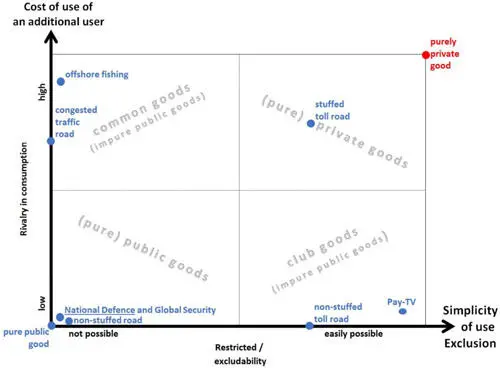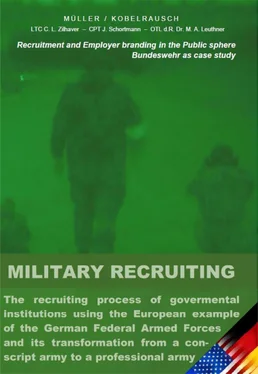2. The public good problem
2.1 The Bundeswehr and the public good "security"
Under Art. 87a of the Basic Law "Installation and deployment of the armed forces" of the Federal Republic of Germany shall be regulated. The task of the BW is the protection of the state and thus the "external security" of the German territory. In direct terms stated in Article 87a of the Basic Law:
(1) The Federation shall establish Armed Forces for purposes of defense. Their numerical strength and general organizational structure must be shown in the government budget.
(2) Apart from defense, the Armed Forces may be employed only if it is expressly permitted by this Basic Law.
(3) The armed forces have the permission to protect civilian property and to perform tasks of traffic control to the extent necessary in order to accomplish their defense mission in the case of a voltage or external danger. In addition, the armed forces may also be used to support police activities in the case of a voltage or external danger to protect civilian property; the Armed Forces shall then cooperate with the competent authorities.
(4) To avert an imminent danger to the existence or to the free democratic basic order of the Federation or the Land, the Federal Government may, if the conditions of Article 91 para. 2 are existent and the Police and Federal Border Police forces are not sufficient, employ the armed forces to support these authorities for the protection of civilian property and in combating organized armed insurgents. The use of force shall be discontinued if the Bundestag or the Bundesrat so demands.
In this way, public good "security" is defined as "internal"and "external security"and the roles of German security forces are clearly stated. The core mission of the Bundeswehr is to maintain and, if necessary, restore external security. The protection of national security, however, is the task of the Police and the Federal Police (formerly Federal Border Police). The use of armed forces inside the country is only possible in a very narrowly defined framework (see also Basic Law Art. 35 with legal and administrative assistance and disaster relief). From the first sentence: The Federation shall establish Armed Forces for purposes of defense. Their numerical strength and general organizational structure must be shown in the government budget. (Art. 87a, sentence 1) follows that the Federal Republic is not just allowed to set up armed forces, but it also must do so in order to defend itself. This implies that the armed forces are maintained adequately with the necessary number of troops and equipment. Through involvement in the budget and parliamentary controls, Parliament sets recruitment parameters for the armed forces in the „Primaries of Politics” 7. The composition of the armed forces may not form a special stratum within the state but should represent a cross section of the society. Referring to the generation of the necessary personnel competencies of Bundeswehr soldiers in connection with the suspension of conscription in 2011 arises the research question of this work. "What are the best recruitment methods of the Bundeswehr? Not only will the attractiveness of the Bundeswehr as an employer be discussed here, but also the issue of public goods. An army serves no end in itself but the provision of the public good" external security". The legitimization comes from the government and the state has a monopoly on violence 8.
2.2 Definition and problem of public goods and resources
2.2.1 Definition
Public goods are characterized by two main qualities. Their classification is based on their consumption ability, the properties of rivalry and excludability (Samuelson, 1954). A public good has the property of
A) non-exclusivity and B) Non-rivalry
A "pure public good" has both of these characteristics. If only one of these properties is present, the given public good is an "impure public good". If, for example, only non-exclusivity with rivalry characterizes consumption 9, the good is a "common good". However, if the opposite is the case, and non-rivalry but excludability is present the goods are "club goods". They are often named artificially scarce goods in or natural monopoly in the literature. If none of these attributes are present, it is a "private good” that is characterized both by rivalry and by excludability. Well-defined property rights are crucial conditions for excludability. Only on the basis of enforceable property rights and copyrights can other individuals be excluded from the consumption of a good, only then can the free and gratuitous access of "freeriders" be denied. For a private good, this is entirely feasible. For a club good this access is tied to the payment of eg a toll or admission charge (these mostly do not to cover the costs of the provision of impure public goods).
In the case of a pure public good, no defined property rights and restrictions can be used (eg air). For a common good, this is also the case, however, consumption rivalry between users prevails (eg deep-sea fishing). This results in a division of pure and impure public goods due to rivalry and access limitation / exclusion as Figure 1 graphically illustrates.
Using this conceptual framework (see also, Mankiw and Taylor, 2009, and Beck, 2011) the good "security" or military can be assigned- in a broader sense - to the following categories 10
- Private security service ((pure) private good)
- Military Museum (artificially scarce good / club good as impure public Good)
- Country / Alliance defense in the case of application for an undersized army (common good as impure public good)
- Country / Alliance defense ((pure) public good)
and
- International Alliance defense (global public good).
Since the existing literature often works with different concepts and diverse examples, the complex summary Figure 2 provides the reader with a comprehensive overview on the public/ private good distinction with respect to externalities in the form of positive and negative externalities, as well as a foundation for defining global public goods (see fig. 2).

Figure 1: Pure and impure public goods
For the military approach, this work focuses on the pure public good 11national defense or collective defense that is consumed as a global public good of the nation / alliance / supranational Community.
The conceptual framework of global public goods (GPGs) has become a kind of reference framework in the global governance debate in the last fifteen years. It provides bilateral and multinational agreements between states as an alternative rationale for supranational cooperation and collaboration and has been extensively discussed in various UN forums (see Schubert and Bayer, 2010, Kaul et al., 1999). For example, in 2002, at the World Summit on Sustainable Development in Johannesburg, the "International Task Force on Global Public Goods" was established. Its task is the provision of various global public goods and developing their financing needs and options 12. While, historically, the provision of public goods has always been a nation-state task, more and more global perspectives are arising with increasing globalization. As the benefit or harm of global public goods or bads transcend national borders, there is a need for increased multinational cooperation. In the military context, the European Union and NATO already took this into practice since 2004 by commissioning of the EU-Battlegroup(s) 13and since 2002 by the decision of the establishment of a NATO Response Force 14.
Читать дальше













